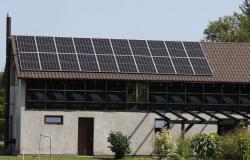
In April, the European Commission (EC) published the renewed list of projects of common interest, which also includes the pumped hydropower storage station “Zero Terrain” in Paldiski. The strategic infrastructure object is the only long-term energy storage project in the Northern Baltic region, which is included in the EC list of projects of common interest and can apply for funding from the Connecting Europe Facility (CEF).
“The Long-Term Energy Storage System (LDES) contributes to energy security as much as conventional power plants and interconnections. Pumped hydropower is the most proven and affordable long-term energy storage system technology, which contributes to the production of renewable energy and reduces customers’ energy bills,” says Pīps Sītams, head of “Zero Terrain” (Peep Siitam).
“It is carbon neutrality and cost efficiency that make this solution one of the cornerstones in the development of renewable energy. The “Zero Terrain” Paldiski pumped hydro energy storage terminal can serve as a new example for EU countries, reducing dependence on both Russian gas and China’s dominance in clean technology. The technology we created provides the opportunity to use the advantages of pumped hydropower storage for other EU countries as well, which was previously impossible due to geographical conditions,” adds P. Sītams.
The project in the city of Paldiski is a 500 MW pumped hydro energy storage station, with the help of which Estonia plans to achieve a 100% transition to independent renewable energy by 2030 and provide consumers with lower electricity prices. The global need for increasing the capacity of long-term energy storage is also increasing – according to the data of the research company McKinsey, the capacity of long-term energy storage systems required worldwide by 2040 will be 85-120 TWh, so the interest in the technology and the project is high, especially in regions where storage of pumped hydro has not been possible until now due to geographical limitations.
166 cross-border energy projects are included in the EC list of projects of common interest, which will contribute to the achievement of the goals of the European Green Deal. These projects reflect the urgency and importance of energy infrastructure development, with more than half dedicated to energy, offshore wind farms and smart grid initiatives.
Zero Terrain has confirmed its readiness to apply for funding from the Connecting Europe Facility, becoming the first pumped hydro energy storage technology to receive this support. Applications for funding are open from April 30 to October 22, and the project is hoping to get a share of the €850 million in funding set aside for energy infrastructure projects. Its inclusion in the EC list of projects of common interest can be seen as an important step towards a more stable, secure and sustainable energy future in Europe.
About Zero Terrain
“Zero Terrain” Paldiski, started in 2009, is a project of common interest of the EU. It is a strategic infrastructure project supported by the Connecting Europe Facility, managed by the European Climate, Infrastructure and Environment Executive Agency. The project received a building permit in December 2022, and an open tender is currently underway, so that construction could begin in 2025, and the project could begin operations in 2031. “Zero Terrain” investors are AS “Alexela”, AS “Sunly”, SIA “Vool”, SIA “Combiwood Group”, SIA “Warmeston” and SIA “Ronnivara”.
Milton Latvia
Tags: highlights role Nordic Baltics longterm energy storage station promoting energy independence Economy finance





